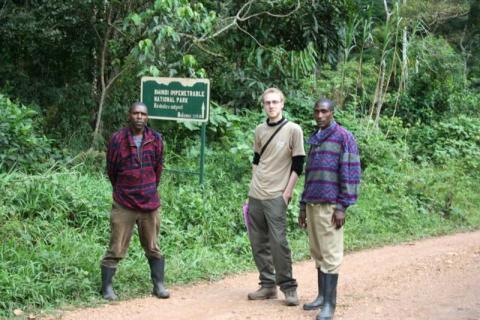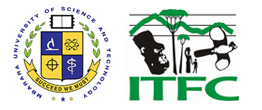The excitement and expectations of my research project leading up to my arrival at Bwindi Impenetrable National Park (BINP) were realised the moment I passed through Ndego Gate on the park’s south-eastern edge and made my way to ITFC. I had been told many stories of southwest Uganda, its people and its landscape in the preceding months by classmates and was extremely happy to have arrived at a place I could call home for the next 2 weeks. It was also extra special witnessing the sunset over Bwindi’s rugged and beautiful terrain from Ruhija village on my first evening there as it also happened to be my birthday.
Settling in at ITFC was almost instantaneous as I met researchers, interns and staff at different stages of their projects that were more than happy to offer advice and experiences on fieldwork in Bwindi. The accommodation was extremely comfortable and was my first experience of living on solar power and using the rainwater collected outside for cooking, cleaning and showering. Plus, the sounds of monkeys and baboons outside my window in the mornings gave the place quite a charm and the most unusual wake-up call I’ve had!

My MSc thesis was to focus on land cover change in and around the park over the period 1987-2005 through satellite imagery analysis and would involve travelling to many locations around the forest to collect GPS co-ordinates, talk to park management and speak with local communities on their perceptions of land cover change and resource use policies. Before I set off around the park, the library at ITFC was the first port if call so I could familiarise myself with materials that were site-specific and ones I couldn’t access from abroad but were much needed for the initial research. These would prove invaluable for the next few weeks’ fieldwork!
For the fieldwork itself, myself, two field assistants and a driver headed off around the park for 6 days to collect data and this often involved traversing gorges, walking around farms of Irish potatoes, sorghum and bananas and hiking to the highest points in the park to collect GPS data. The field assistants constantly provided important information on so many aspects of the park from flora and fauna to park history and management and in the evenings we often shared experiences and stories from home and abroad that would last late into the night! Perhaps the most rewarding aspect of the fieldwork itself was in meeting community groups that were registered as resource users within the park’s Multiple Use Zone (MUZ) policy. The friendliness of the people of southwest Uganda and their openness to my many questions was perhaps what stood out most and meeting these people made me genuinely sad to leave.
Although my time in Bwindi was relatively short, it is a place that has left so many special memories, not limited to the research itself. Whether it was a day hiking in the forest, walking through Ruhija village or listening to the football from home on the radio with ITFC interns, it all added up to an amazing experience I will never forget. I only hope to visit again in the near future and visit the many friends I made during my time there.
